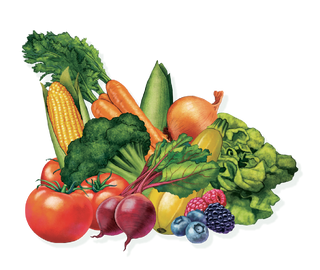Composting Cub Scouts
Q. I've listened to your podcast for a couple of years and know that you are the king of compost. That's why I'm writing. Boy Scouts of America has a new program designed to teach Cub Scouts about composting. But they're telling the kids to dig a hole in their back yard and sink a trash can with holes drilled into it into the hole. That's a big task to ask of some families. Is there another way they can make their own compost out of food scraps? I'm attaching the Scout handout on the trash can method. How would you go about teaching eight-year-old youngsters about composting?
- ---Jim, a Cubmaster in Illinois
A. Here's the handout Jim sent; it really does say to get an adult to drill holes in a metal trash can and sink it into a foot-deep hole in your backyard. (Seems like a waste of a good trash can to me.)
Then it says to fill the holey can with kitchen waste, which is probably why they came up with this system. The Scouts want to focus on composting food scraps, which makes a lot of sense; every home has them, and they seem easy to recycle to the untrained eye. And so the metal trash can—with a specified tight fitting lid—is almost certainly designed to discourage rats, mice, raccoons and other vermin from showing up at the party.
But as we often warn, filling an outdoor container with kitchen waste generally just produces a container of really smelly garbage a few months later. And because Scouting gears up for these new programs at the beginning of the school year—just as winter is approaching—it's going to produce frozen garbage in Northern parts of the country
…Which is going to send the absolutely-incorrect message that composting doesn't work. Composting does work; but this is NOT composting! We repeat; a composter filled with kitchen garbage alone is probably always going to remain a composter filled with kitchen garbage.
Now, they do talk about adding things to the scraps. It's a list of the 'usual suspects': one-third kind-of good ideas; one third really bad ideas; and one-third good ideas that just need a little explanation and detail, like saying to include grass clippings without any warning that the finished compost can kill plants if the lawn was treated with herbicides. And 'fall leaves' with no mention of shredding them; as we always warn, whole leaves tend to mat down and resist composting.
OK; those are a few of the ones that just needed some more detail. The really bad ideas?
How about pine needles? Hey kids—let's make compost with sharp edges!
And cardboard. Now, you can use the shredded paper that's also on the list; it doesn't contain any nutrients, but it is a "dry brown" that will help move the kitchen waste along. But this is the first time I think I've seen cardboard on one of these lists—and I thought I had pretty much seen it all. Not sure how you would even shred cardboard…
Anyway, every community has a place where you can drop off paper and cardboard to be professionally recycled into products like paperboard and tissues. Paper and cardboard have real value in the world of recycling, and the Scouts should be encouraging use of these existing waste streams. Compost piles are not trash cans!
Oh wait—the Scout ones actually are…
Anyway, the basic problem here is that recycling kitchen waste is pretty tricky to do. The absolute best method is to use an indoor worm bin. The specialized redworms used in these systems are great at breaking down kitchen waste and turning it into worm castings—an excellent natural fertilizer for just about any plant. (And I think eight-year-olds would love watching the worms at work!)
You could also mix small amounts of kitchen waste into big piles of shredded leaves that are somehow protected from vermin. Yes; I realize that many people just mix their garbage into big piles of unprotected leaves outdoors, but an organization like the Scouts can't—and shouldn't—suggest anything that might attract rats. And I've stopped that practice as well; my big piles of shredded leaves only get coffee grounds and spent garden plants as compost companions. I recycle all of our (abundant!) kitchen waste one of two ways:
- Through my 'worm tower'—a worm bin with stackable layers that makes it REALLY easy to harvest the finished product; just remove the lowest tray and spread the castings around your garden. New trays of kitchen waste (covered by shredded newspaper as 'bedding') go on the top levels. The worms naturally make their way up to the new trays when they're finished down below. (And there's no smell, no mess, and the worms don't 'escape'.)
- Outdoors in one of my four sealed black plastic composters. These great 'recyclers' have open bottoms, locking lids and sliding 'coal chute' doors at the bottom to harvest the finished compost. I keep a big pile of shredded leaves nearby, add a nice helping of those shredded leaves every time I add some kitchen waste and harvest the finished compost from the bottom a few months later. No vermin issues; and these units look really neat—the kind of thing you can have in the nicest backyard without attracting any kind of complaints from nearby neighbors.
So, along those lines, here's an idea that tries to buy somewhat into the trash can concept. The Scouts say to begin by drilling small holes in the bottom of a metal trash can. I'm going to suggest making the holes really big—or using a plastic trash can with a locking lid and cutting the bottom out entirely. Then just shove it a few inches into the ground to make it easy for earthworms to come and go—it doesn't have to be a foot deep! (Heck, you can just sit it on bare ground—that's what I do with mine.)
Put some fruit and vegetable waste in the bottom and then cover it with either shredded newspaper (which is better than no brown material at all); or ideally, a layer of shredded leaves. (The time is right for the Scouts to have access to LOTS of leaves; and fall leaves make the best compost!) Then continue, making sure the layers of shredded leaves or paper are two to three times the amount of kitchen waste.
In essence, we're making a kind of outdoor worm bin, but using earthworms instead of the red wrigglers that go into indoor worm bins. This basic concept works really well for me in those big black plastic composters; and maybe the kids can talk a parent or older sibling into stirring the contents a couple of times—especially before winter shuts it down. That really speeds things up.
Otherwise, we really want to stress that food waste is tricky to recycle outdoors without attracting flies and rats. Yes, kitchen waste seems like low hanging fruit, so to speak, but composting kitchen waste is actually a tough thing to do well at any age, much less when you're in the single digits. So for next season I want to propose an alternative:
Issue a nationwide challenge to see which Den can build the biggest pile of shredded leaves in the fall. They would have to shred the leaves—either with a leaf blower set on reverse, a bagging mower or maybe just the energy of eight-year-olds unleashed. No kitchen waste. Maybe let them add coffee grounds as they go; nothing else. (Coffee grounds + shredded fall leaves make excellent finished compost. Plus the Scouts can work with local coffee shops to keep their grounds out of the waste stream! And no vermin are attracted.)
Then count how many wheelbarrows of finished compost each Den has made from their pile(s) on a specific date right before scouting breaks for the summer. (The finished compost will be huddled at the bottom of the piles.)
The Scouts would keep tons of leaves out of the waste stream; and they'd make enviable amounts of excellent compost!

